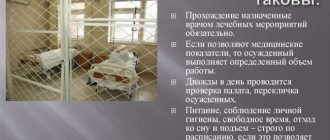The Constitution of the Russian Federation establishes the right of every citizen of our country to receive affordable and free medical care. This applies to all categories of persons without exception, including those serving a sentence of imprisonment for a certain period.
The living conditions for convicts in Russian prisons are quite harsh, so existing health problems are often significantly aggravated in captivity. In addition, among prisoners there is a fairly large percentage of people who suffer from drug addiction and alcoholism in chronic forms, and this also requires intervention from doctors.
In order to provide medical care to prisoners of Russian colonies, medical and correctional institutions have been allocated in the penitentiary system.
Medical services in places of deprivation of liberty or special medical facilities
Article 101 of the Criminal Executive Code of the Russian Federation defines in general terms the procedure for medical care for persons serving sentences in Russian prisons.
Free legal consultation
+8 800 100-61-94
Medical and sanitary care for convicts is provided both on an outpatient and inpatient basis. In accordance with the internal regulations, each correctional colony has medical units and blocks where convicts can receive the necessary primary medical care.
Important! If necessary, for example, to receive high-tech medical care, convicts can be sent for treatment to municipal and federal health care institutions. However, this is possible in exceptional cases in agreement with the hospital management. During the entire period of treatment, the prisoner is under the protection of FSIN employees.
In addition, a network of treatment and preventive departmental institutions has been created in the penal system.
They carry out treatment, observation and dispensary registration of persons who are sentenced to imprisonment for a certain period. These include:
- hospitals;
- medical parts;
- psychiatric hospitals.
Certain types of health care facilities are medical and correctional institutions - a relatively new phenomenon in the Russian penitentiary system. They are created for the referral and maintenance of persons who have certain chronic diseases and require constant treatment and monitoring.
It is the features of such institutions that will be discussed further, although the conditions of stay in them are in many ways similar to the conditions of detention in other types of medical institutions of the criminal correctional system.
It is also useful to read: Special regime colony
Basic provisions and concept of a medical institution
A treatment and preventive institution in the penitentiary system of the Russian Federation should be understood as a special medical institution where treatment is provided for citizens sentenced to imprisonment.
Medical correctional institutions are a type of medical institution where persons suffering from drug and alcohol addictions, as well as those with an open form of tuberculosis, are kept on a permanent basis.
It should be noted here that the conditions for undergoing treatment in a hospital institution administered by the Federal Penitentiary Service differ significantly from the organization of the therapeutic process in “civilian” healthcare institutions. Patients are subject to the requirements of internal regulations, and, in addition, they are significantly limited in movement.
Attention! A special feature of medical and correctional institutions of the Federal Penitentiary Service is that, unlike other types of health care facilities, they offer the possibility of maintaining and outpatient treatment of patients. Thus, such an institution, in fact, is not much different from an ordinary correctional colony.
Who ends up in such institutions?
In accordance with Article 101 of the Criminal Executive Code of the Russian Federation, convicts belonging only to a separate category serve their sentences in medical correctional institutions. These include:
- Suffering from drug addiction . Persons who have an appropriate medical certificate indicating that they are addicted to drugs. In the penitentiary institution, conditions are created that prevent prisoners from taking narcotic substances, and their rehabilitation is also carried out.
- Suffering from alcoholism . Citizens convicted of certain crimes who have a confirmed medical diagnosis of alcoholism.
- Patients suffering from an open form of tuberculosis . Infectious patients suffering from open tuberculosis are kept separately from prisoners who do not have a similar problem.
How is a decision made to send a convicted person to a given institution?
The decision to execute the punishment and send the patient to a prison facility is made if there are necessary indications. To carry out a transfer, a representation from the head of the medical unit of the correctional colony is required, which must be agreed upon with the head of the operational unit and the leadership of the Federal Penitentiary Service in a particular region.
Based on this submission, the head of the correctional colony sends a request to the prison where the sick prisoner is supposed to be sent. Such a request must be accompanied by a medical record and examination results of the convicted person.
If the management of the prison agrees to accept the prisoner, his transfer will be organized. The latter is possible with the consent of the patient, which must be sent along with the request. If the prisoner has limited legal capacity, then consent is sought from persons who are his legal representatives. It should be noted that the transfer of persons who have an open form of tuberculosis is carried out exclusively by special transport accompanied by medical workers.
When refusing to admit a patient, the administration of a medical correctional institution is obliged to do so in writing, indicating the reasons, and also provide recommendations for treating the prisoner by medical specialists on the territory of the correctional colony.
Reference! A patient can be sent to a prison facility either from the colony where he is serving his sentence or from a pre-trial detention center.
If, after a course of treatment, a prisoner has no reason to leave the prison, then he is transferred in accordance with the established procedure to the colony where he previously served his sentence.
Changing the category of PS
Changing the type and category of the penal institution is considered in court. The legal basis is Article 78 of the Penal Code.
The revision of the category of penal arrest is determined strictly depending on how the offender behaves and how he relates to the work activity assigned to him. At the same time, a certain time indicator is taken into account. If a person behaves well, if he does not violate the order established by management, the following actions are taken:
- From a prison building to a more lenient colony - after spending at least half of the total sentence time in prison.
- From a special regime correctional facility to a strict correctional facility - if you spend 50% of the allotted time there.
- From a general correctional institution to a specialized public settlement - after staying in the first for approximately 1⁄4 of the prescribed period.
- From a strict correctional colony to a standard settlement colony, strictly 1/3 of the prescribed sentence must pass. If the offender has committed a particularly serious criminal act, the condition for transfer will be serving 2/3 of the period in the penal colony.
To make a transfer, you will need to contact the administration of the PS. The following persons can do this:
- The prisoner himself or his representative.
- Lawyer defending the offender.
- Administration of the establishment.
A properly completed petition is sent to the court within 10-12 days from its submission to the administration. The application must be submitted simultaneously with the written reference for the prisoner. In some cases, these documents are supplemented by a doctor’s opinion.
The administration of the correctional institution has the right to officially apply to the court to change the previously established category of the educational institution. The petition can be directed not only towards improving living conditions, but also towards worsening them.
Procedure for serving the term
In prisons, prisoners are kept in common areas. The exception is patients with infectious diseases, who, for the purposes of sanitary and epidemiological well-being, must be kept in separate boxes and wards.
The daily routine in such an institution involves regular therapeutic and diagnostic measures . Moreover, with the exception of the latter, it practically does not differ from the conditions of stay in a regular correctional colony.
Prisoners in prisons must undergo proper treatment. If a prisoner refuses to undergo treatment, sanctions may be applied. For example, they may be placed in a punishment cell.
The possibility of placing a patient in a punishment cell depends directly on his state of health. At the same time, medical contraindications for this are taken into account. While in the punishment cell, the patient must receive all necessary treatment.
Prisoners serving their sentences in a penitentiary institution may be required to work on a general basis. However, this is only possible according to the decision of the attending physician. If the state of health of a convicted person does not allow him to work, then it is simply impossible to attract him to this or that work.
As for the regime of detention, it is different for different prisoners. The regime of detention in a penitentiary institution depends on the regime of the convicted person in the correctional institution from which he arrived. Conditions of detention determine, first of all, the volume of prisoner parcels received, as well as the number of permissible visits.
In practice, this means that some prisoners may, for example, have more visits, while others may have significantly fewer.
When deciding whether to organize a visit, the health status of the convicted person is taken into account. If for one reason or another a visit is impossible, the prisoner is denied it. If the reasons why a meeting with relatives was impossible are eliminated, the convicted person has the right to a meeting on a general basis.
It is also useful to read: Colony-settlement
Choosing a correctional facility for repeat offenders
Recidivist behavior automatically entails a change in the scheme of serving in a special institution. This rule is spelled out in Article 58. A repeat offender prisoner, based on a preliminary court verdict, can be redirected to the following institutions:
- In a correctional institution with a strict educational regime, if the person was in a correctional institution with a regular correctional direction.
- In the penal colony of a special conclusion in case of a particularly dangerous relapse.
- Spending some part of the allotted time of conviction in prison - when returning to criminal activity.
If women are sent to places of detention with a repeated violation, they are assigned to a special correctional facility after committing a dangerous recidivism. Other criminals serve their sentences in standard general prison colonies or in settlements that are more lenient according to established procedures.
Being in any type of correctional facility leaves an indelible mark on the convicted person and on his life. To avoid this, do not violate modern law!
Serving period
It should be taken into account that a medical correctional institution is a specialized link in the penitentiary system of the Russian Federation. In this regard, prisoners can only stay there if there is a reason to do so.
So, if by the time of recovery the sentence of the convicted person has not expired, then he is necessarily transferred to the colony where he was kept before.
If at the time of release the patient is in a medical facility, then the period of his stay in the institution cannot be increased due to this circumstance.
Important! The length of stay in medical-correctional and treatment-and-prophylactic institutions is determined by medical indications.
Inner order rules
According to the internal regulations in correctional medical institutions, only men convicted of:
- especially dangerous recidivism of crimes;
- those sentenced to life imprisonment;
- convicts for whom the death penalty was commuted to life imprisonment by way of pardon.
These categories of prisoners are housed in specially designated and equipped prison-type rooms.
Minors are also kept separately from others, and women are kept separately from others. Patients with various infectious diseases are accommodated according to the type of infection and separately from somatic patients.
Convicts who are in a treatment facility are prohibited from long visits; they can be replaced by short-term ones.
The heads of medical correctional colonies provide short-term visits, according to the standards established for the relevant types of institutions from which the convicts arrived.
In the event of a serious illness that threatens the life of a prisoner, the head of the colony provides the opportunity for relatives to visit him . Such a visit does not count towards the main date.
In cases where convicts are transferred to medical institutions from punishment cells or cell-type premises, general or maximum security colonies in prisons, due to self-harm or stimulation of the disease, the period of their stay in the medical institution is not counted towards the period of serving the penalty. .
For violation of the procedure for serving imprisonment in medical correctional institutions, convicts bear responsibility in full, if their execution does not contradict medical indications.
Convicts who maliciously violate the order of serving their sentence may be discharged from a medical institution and transferred to their previous place of detention, if medical indications allow this.









